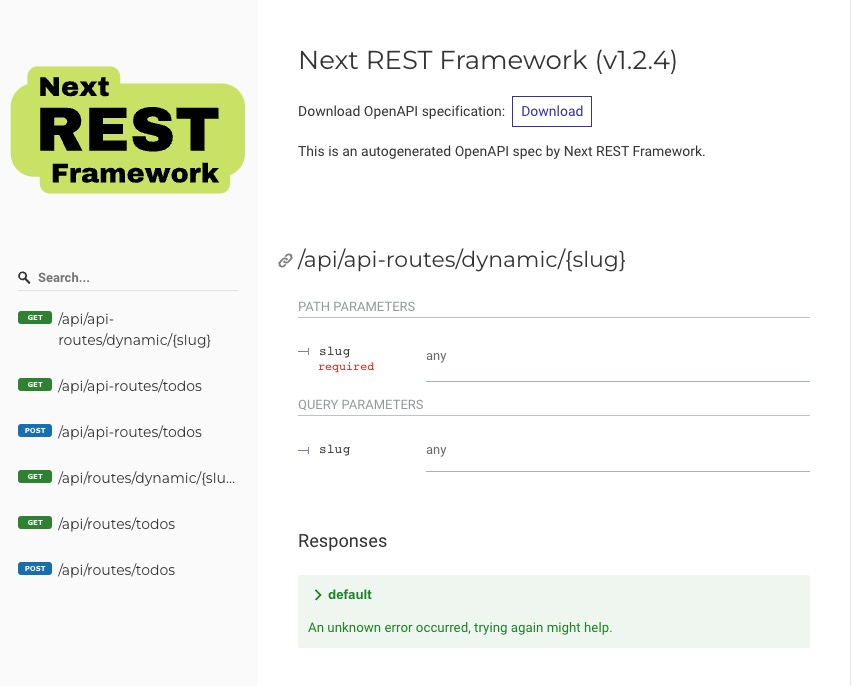Getting started
Installation
npm install --save next-rest-framework
Initialize docs endpoint
To get access to the auto-generated documentation, initialize the docs endpoint somewhere in your codebase. You can also skip this step if you don't want to expose a public API documentation.
App Router:
// src/app/api/route.ts
import { defineDocsRoute } from 'next-rest-framework';
export const GET = defineDocsRoute();
Pages Router:
// src/pages/api.ts
import { defineDocsApiRoute } from 'next-rest-framework';
export default defineDocsApiRoute();
This is enough to get you started. Now you can access the API documentation in your browser. Calling this endpoint will automatically generate the openapi.json OpenAPI specification file, located in the public folder by default. You can also configure this endpoint to disable the automatic generation of the OpenAPI spec file or use the CLI command npx next-rest-framework generate to generate it. You can also use both App Router and Pages Router simultaneously by combining the examples above. See the full configuration options of this endpoint in the Config options section.
Add a route
App Router:
// src/app/api/todos/route.ts
import { defineRoute } from 'next-rest-framework';
import { NextResponse } from 'next/server';
import { z } from 'zod';
const handler = defineRoute({
GET: {
output: [
{
status: 200,
contentType: 'text/html',
schema: z.object({
foo: z.string(),
bar: z.string(),
baz: z.string(),
qux: z.string()
})
}
],
handler: () => {
return NextResponse.json(
{ foo: 'foo', bar: 'bar', baz: 'baz', qux: 'qux' },
{
status: 200,
headers: { 'Content-Type': 'text/plain' }
}
);
}
},
POST: {
input: {
contentType: 'application/json',
body: z.object({
foo: z.string(),
bar: z.number()
})
},
output: [
{
status: 201,
contentType: 'application/json',
schema: z.object({
foo: z.string(),
bar: z.number()
})
}
],
handler: async (req) => {
const { foo, bar } = await req.json();
return NextResponse.json(
{ foo, bar },
{
status: 201
}
);
}
}
});
export { handler as GET, handler as POST };
Pages Router:
// src/pages/api/todos.ts
import { defineApiRoute } from 'next-rest-framework';
import { z } from 'zod';
export default defineApiRoute({
GET: {
output: [
{
status: 200,
contentType: 'application/json',
schema: z.object({
foo: z.string(),
bar: z.string(),
baz: z.string(),
qux: z.string()
})
}
],
handler: (_req, res) => {
res.status(200).json({ foo: 'foo', bar: 'bar', baz: 'baz', qux: 'qux' });
}
},
POST: {
input: {
contentType: 'application/json',
body: z.object({
foo: z.string(),
bar: z.number()
})
},
output: [
{
status: 201,
contentType: 'application/json',
schema: z.object({
foo: z.string(),
bar: z.number()
})
}
],
handler: ({ body: { foo, bar } }, res) => {
res.status(201).json({ foo, bar });
}
}
});
These type-safe endpoints will be now auto-generated to your OpenAPI spec!
